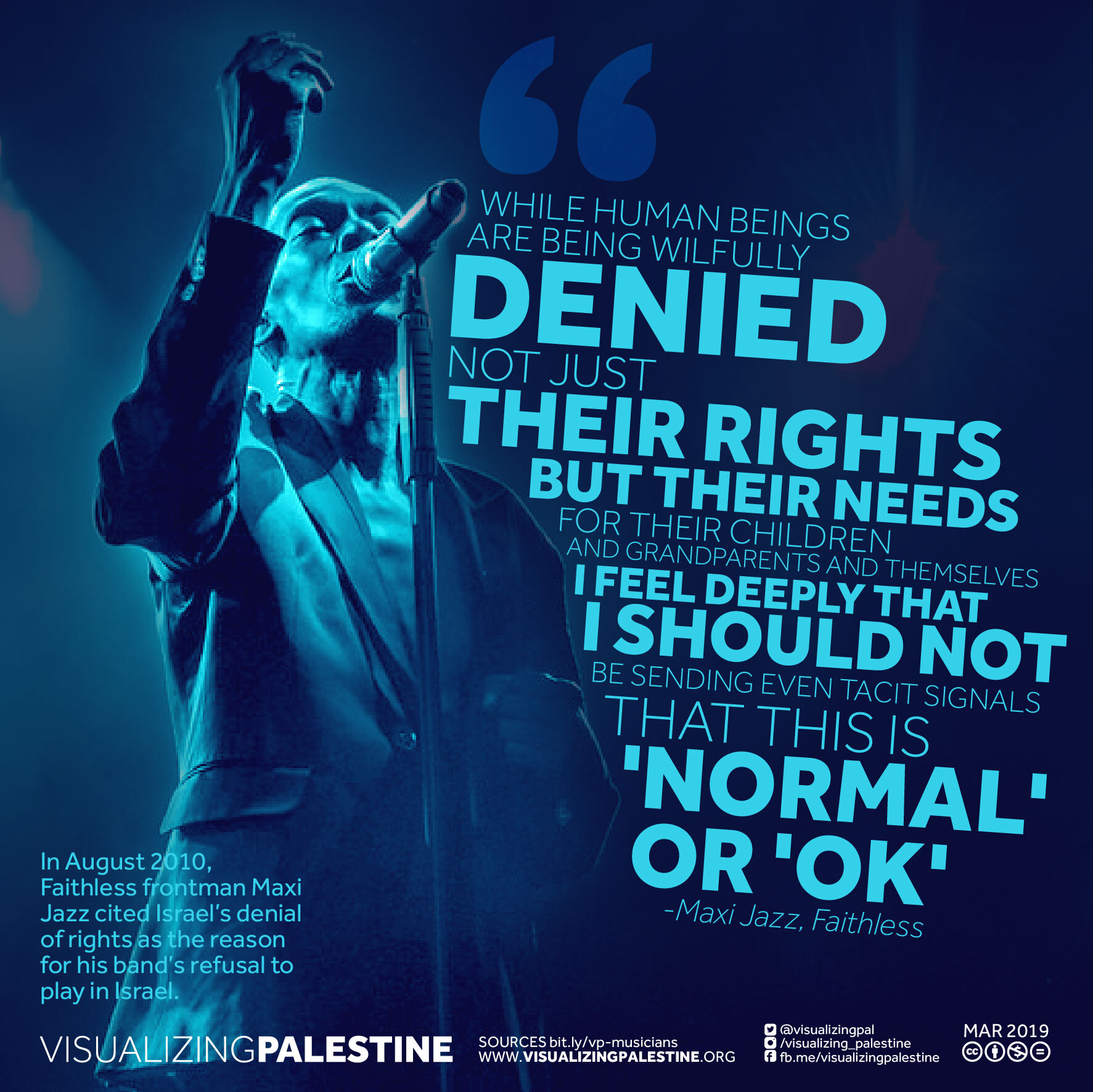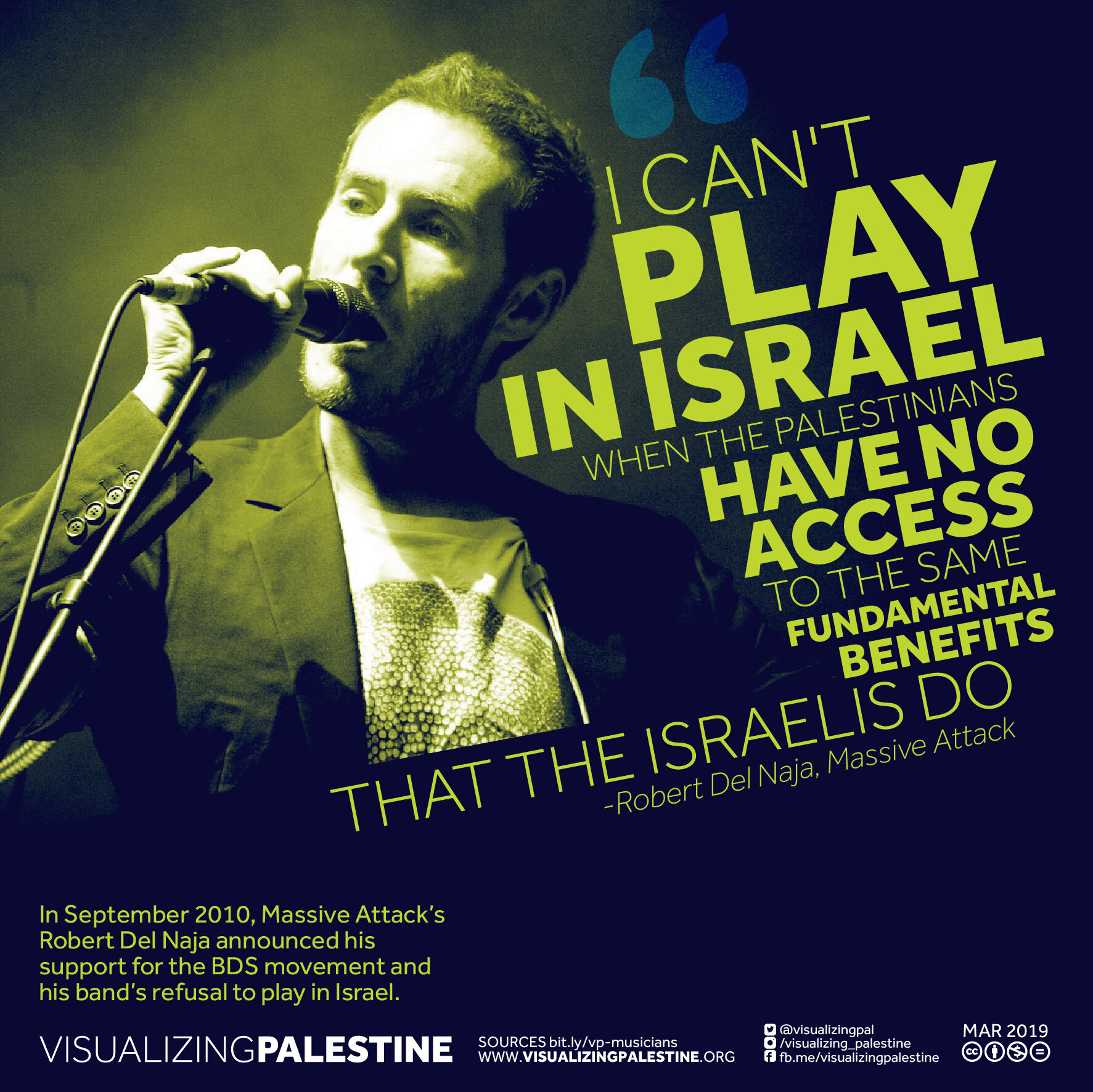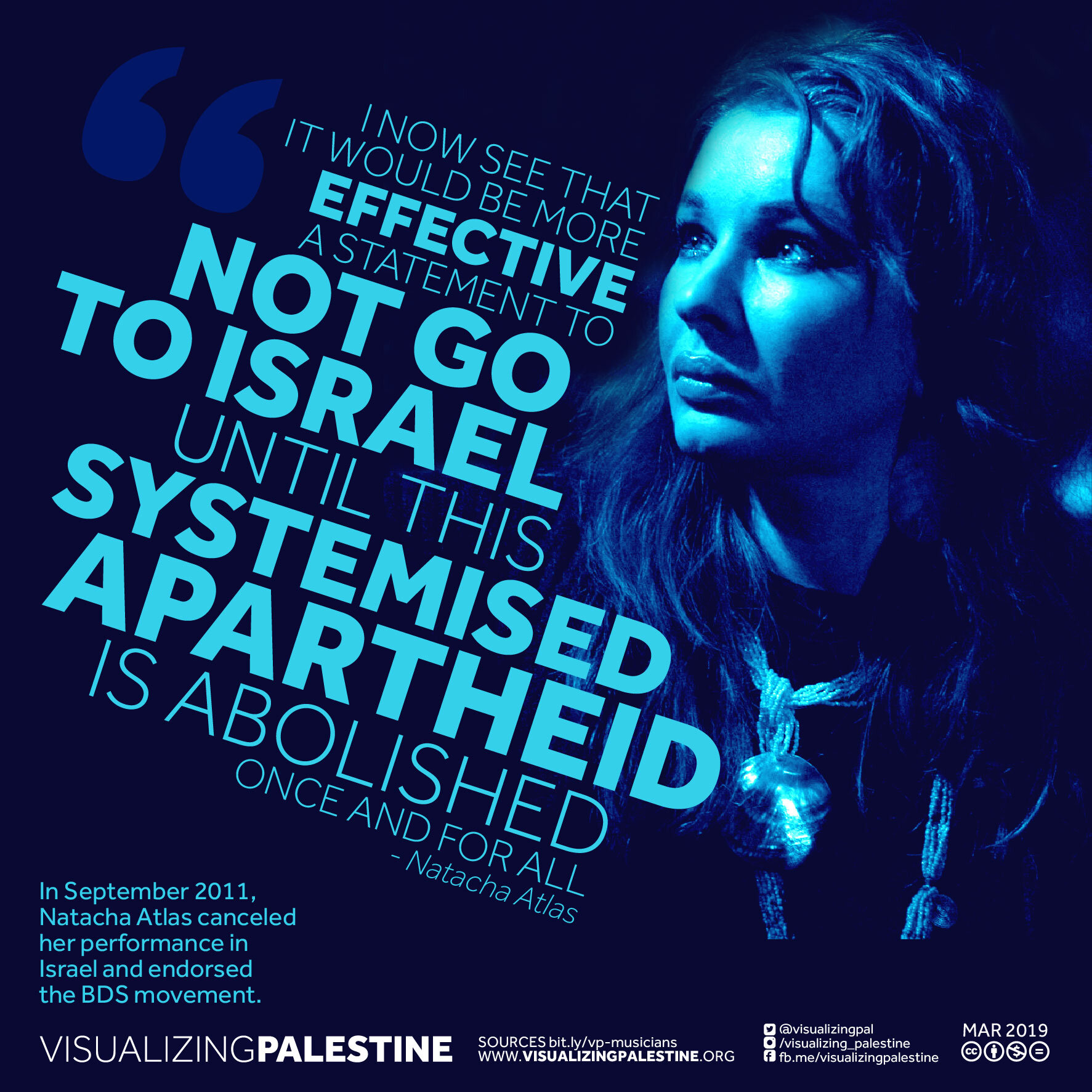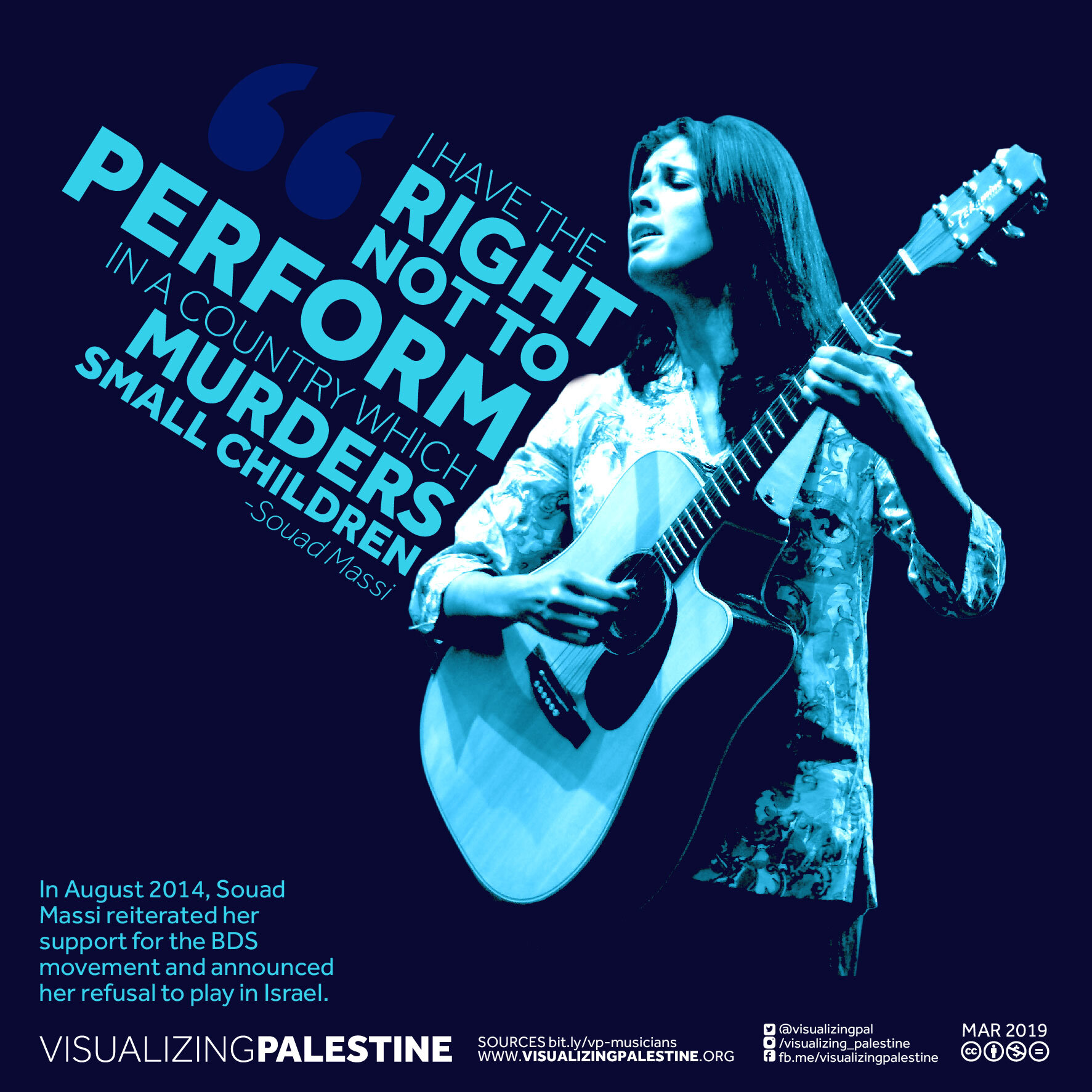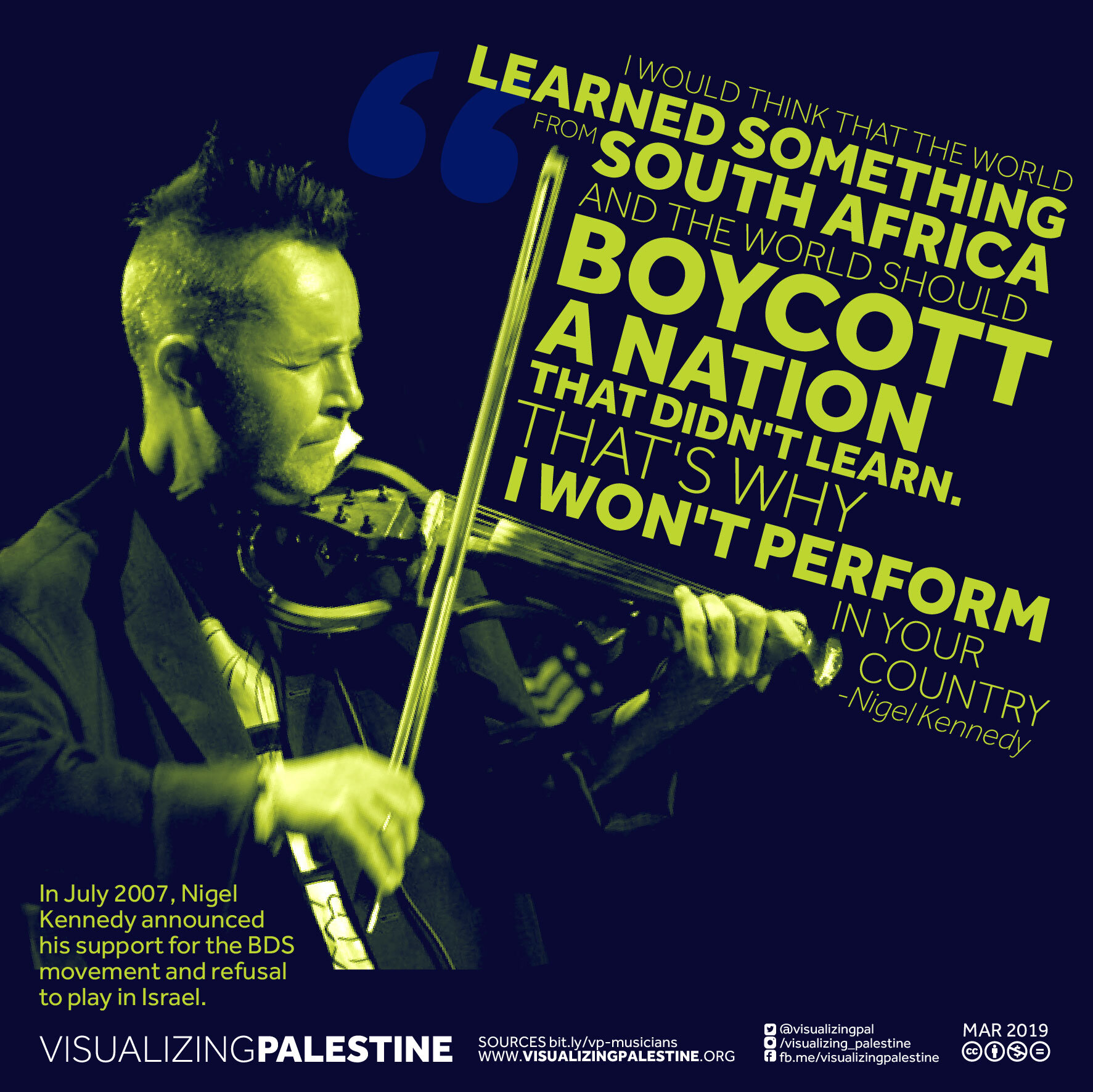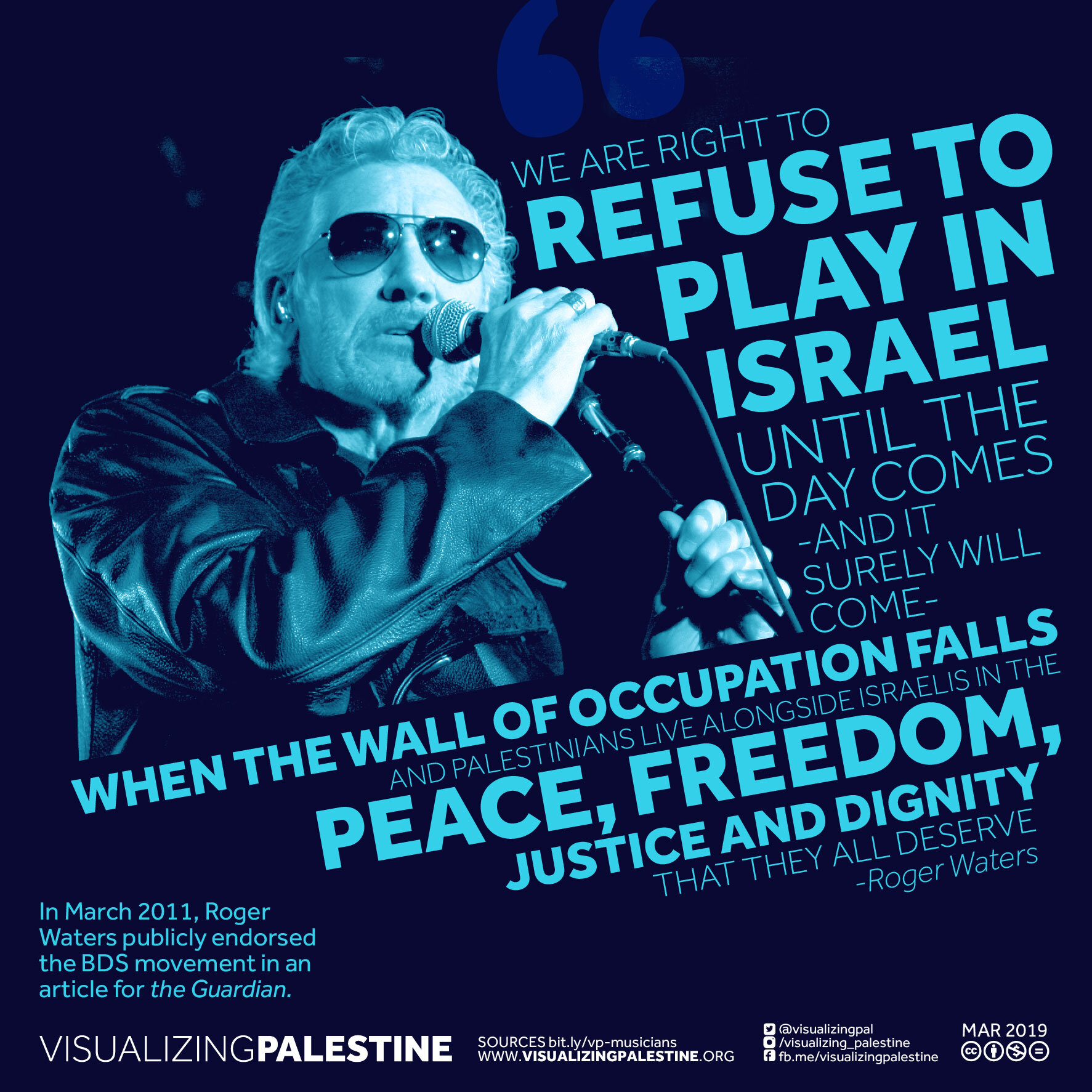Frequently Asked Questions about the Cultural Boycott
WHY CULTURAL BOYCOTT?
For decades, Palestinians have lived under and struggled against a system of Israeli occupation, colonization, and apartheid. Today, the vast majority of Palestinian civil society calls upon people of conscience around the world to use boycott, divestment, and sanctions (BDS) to pressure Israel to respect international law and Palestinian human rights.
One of the most important elements of BDS is cultural boycott. The Palestinian Campaign for the Academic and Cultural Boycott of Israel (PACBI) asks us all to recognize Israeli cultural institutions’ complicity with Israeli apartheid, to refrain from participating in cultural events in Israel, and to boycott events throughout the world that are sponsored by the Israeli government, Israel lobby groups, and complicit Israeli institutions. This campaign is not a boycott of individual Israelis, but of Israeli institutions that help maintain the multitiered system of oppression of the Palestinian people. PACBI has developed a full set of guidelines for evaluating whether an institution, project, or event is boycottable, and the BDS National Committee has outlined the basic principles of those guidelines.
New York is a worldwide cultural hub, and is one of the centers of the "Brand Israel" initiative, through which the Israeli government attempts to “show Israel’s prettier face, so we [Israel] are not thought of purely in the context of war,” as the Israeli Foreign Ministry’s deputy director general for cultural affairs put it. Artists and cultural workers in New York City are committing to Palestinian rights by refusing Israel’s use of the arts to whitewash its violations of international law and by upholding the Palestinian call for cultural boycott as explained in PACBI's guidelines.
DOESN’T CULTURE TRANSCEND POLITICS?
Israel has politicized art by exploiting it to help “rebrand” its apartheid regime. The Israeli government employs a “Brand Israel” campaign to paint Israel as a center for arts and culture, and distract attention from Israeli repression. In 2005 an Israeli Foreign Ministry official explained: “We see culture as a propaganda tool of the first rank, and I do not differentiate between propaganda and culture.” Engaging with Israel supports the existing power relations and makes a political statement in support of the settler-colonial apartheid regime. As Elvis Costello put it upon canceling his concert in Israel, “There are occasions when merely having your name added to a concert schedule may be interpreted as a political act that resonates more than anything that might be sung.”
WHY SINGLE OUT ISRAEL?
Israel perpetrates serious crimes without sanction, while benefiting from preferential trade agreements, diplomatic protection, and military aid. The US grants Israel the most aid of any country, and shields Israel from any criticism in the UN and international forums. In reality, Israel is singled out for impunity, and privileges. With governments failing to act, a civil society-driven boycott is an appropriate response. As the late Stéphane Hessel, a concentration camp survivor and diplomat who participated in the drafting of of the UN Declaration of Human Rights, put it, “[BDS] campaigns around the world present the most promising way to overcome the failure of world governments to stand up to Israel’s intransigence and lawless behavior.”
ISN’T THE BOYCOTT OF ISRAEL A FORM OF ANTISEMITISM?
The BDS call doesn’t target Jews, or even Israelis as Jews. The call is strictly directed against Israel as a colonial power that violates Palestinian rights and international law. Furthermore, the BDS movement has growing support from progressive Jews who refuse to allow Israel to speak in the name of all Jews. Labeling actions that target Israeli apartheid and colonial rule as antisemitic is itself antisemitic, because it assumes that all Jews are somehow responsible for Israeli crimes.
DOESN’T THE CULTURAL BOYCOTT VIOLATE ISRAELI CULTURAL WORKERS’ RIGHTS?
For decades, Palestinian artists have faced stifling Israeli travel restrictions, arbitrary detention, political repression, and other barriers that prevent them from rehearsing, exhibiting work, and performing. The world has been silent about these systematic violations of Palestinian cultural workers’ rights. However, now that an Israeli cultural worker may be impacted by a boycott due to their complicity in those rights violations, some are prioritizing Israeli artists’ unconditional access to audiences. They would treat cultural workers’ rights not as a freedom for all, but rather as a privilege for some.
WON’T PUNITIVE MEASURES ALIENATE RATHER THAN PERSUADE ISRAELIS?
The world has tried "constructive engagement" with Israel, as it did with apartheid South Africa. This approach has utterly failed again. Israel’s violations of Palestinian rights have only escalated: expanding settlements, further confiscation of Palestinian land, new restrictions on movement and speech, and the collective punishment of Palestinians in Gaza with a brutal blockade and multiple large-scale military attacks that have killed thousands and injured tens of thousands. Nonetheless, Israel has not faced punitive measures, but has been given more weapons and aid. The world has enabled increasingly brutal Israeli actions.
DOES THE BOYCOTT TARGET INDIVIDUALS OR INSTITUTIONS? WHY ARE SOME ISRAELI ARTISTS TARGETED?
The Palestinian Campaign for the Academic and Cultural Boycott of Israel (PACBI) calls for the boycott of Israeli cultural institutions. PACBI’s guidelines state that virtually all Israeli cultural institutions, unless proven otherwise, are complicit in maintaining the denial of basic Palestinian rights, whether through their silence or involvement in whitewashing or diverting attention from Israel’s rights violations. Accordingly, these institutions (mainly major state and public entities), all their products, and all the events they sponsor or support must be boycotted. Similarly, international artists and cultural workers are urged not to exhibit, present, or showcase their work or lecture at complicit Israeli cultural institutions or events, or to grant permission for the publication or exhibition of work by such institutions. Individuals are targeted only if they represent the State of Israel or a complicit Israeli institution, or help Israel to “rebrand” itself. Individuals are not targeted by the cultural boycott based on identity (citizenship, race, gender, or religion) or opinion.
CAN I GO TO ISRAEL, MEET ISRAELIS, AND NOT VIOLATE THE BOYCOTT?
Yes, some artists have demonstrated how to go to Israel, engage with Israelis, and not violate the cultural boycott. They interacted solely with venues, organizations, and publishers that were antizionist.
WHERE CAN I LEARN MORE ABOUT CULTURAL BOYCOTT?
The website of the Boycott, Divestment, and Sanctions National Committee (BNC) has an extensive section on cultural boycott. Artists for Palestine UK has produced a booklet, The Case for the Cultural Boycott of Israel, available both in print and online. O/R Books’ Assuming Boycott, edited by Kareem Estefan, Caren Kuoni, and Laura Raicovich, covers many aspects of boycott, including cultural boycott and features essays by artists, writers, curators, and critics. Omar Barghouti, a founding member of the BNC, has written a broad overview on the BDS movement, Boycott, Divestment, and Sanctions: The Global Struggle for Palestinian Rights, published by Haymarket Books. Comic artist Ethan Heitner has created a zine about cultural boycott, Power of Our Voices, which features interviews with Palestinian artists (available for online viewing or for producing a printed, folded zine).
HOW CAN I JOIN THE MOVEMENT?
If you are a NY-based artist or cultural worker, sign the Amplify Palestine boycott pledge! If you are outside, NY, look for cultural boycott campaigns and pledges in your area on the BNC website.
In addition to pledging to respect the boycott, there are many other ways to take action, such as letting your favorite artist know about the boycott, organizing a statement of support for the boycott from artists in your country or field, bringing artists and cultural workers together to learn about the boycott, and making sure your local venue is “apartheid free.”
